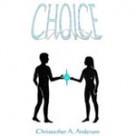Choice
Posted

Excerpt From the Book: But do we have choice? Here in the United States we had a revolution for liberty so that one could engage in the freedom to choose, which one must do to formalize one’s life. But just between you and I, I don’t feel so very free in my ability to choose. Metaphysically, yes, but in actuality, not so very free. Supposedly, we are free to choose, so in actuality one would think that we would be free to act upon that supposition. But I don’t think that is the case. There seems to be a number of people telling me what I can or can’t do. They somehow are controlling my choices saying I can only choose this or that, and worse, I don’t have the same right to control their choices. Something seems not quite right. (Page 2) Read More…
Book Description:
Do you have it? If not, why not? It may require us to look into this issue in more depth to see why, although we often think we posses choice in our lives, we often have little of it. — Pamphlet – 20 pages © 1985, Revised Edition, 2010
Purchase and Instantly Download the full e-book: $4.50

Complete Excerpt (continued):
To not allow people a choice regarding the reception of something is the same thing as not allowing them a choice as to their giving of something. If someone says to us, “Give me your money or else,” most of us clearly know what that is. It is thievery. Is this any different from one saying to us, “Receive this at this cost, or else”? The issue here is choice. Does on have it or not? It does not matter whether one is demanding that we give or receive, if you are not at choice the action is thievery. And what inevitably accompanies thievery? Coercion. (Page 7)
In my defense of the individual, I do not suggest that the individual be considered before another in any self-other relationship. I do not advocate sole individualism for that, too, creates a self-other imbalance—me before you at all costs—that more often than not creates the counter imbalance of collectivism. I suggest both sides of any self-other relationship be considered metaphysically equal, thus preventing either side from substantiating a fundamental superiority over the other with the right to special privileges. Now, it does not matter what the lines are that one divides his self-other relationship upon. One may divide it in religious terms calling it “self-God,” or in political terms calling it “self-state,” and so forth. Regardless, both sides must be considered metaphysically equal for freedom of choice to exist. (Page 13-14)
For myself, I am a little tired of all the politicians telling me how important it is to vote, how it is my duty as a “freeman” while they just continue to tighten the purse strings. Why should I continue to play into their hands? Why shouldn’t I use this new metaphysics of choice and express my choice by not voting for the candidates and laws that only exist within the old parameter where the issue is not a choice whether to pay or not but only “how much”? Anyway, if Karl Marx can call for a worker’s revolution viaThe Communist Manifesto, I can call for a voter’s strike via the New Metaphysics of Choice. At least I can do this for myself—with liberty and justice for all. (Page 19)

